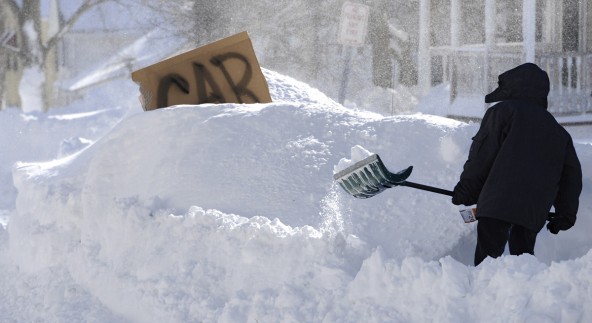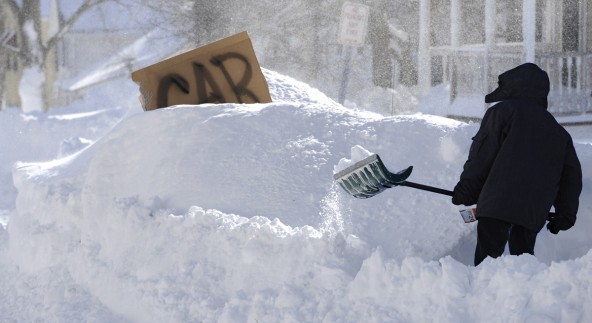You’ll have to forgive people from the Midwest for thinking less of you on “snow days.”
I was raised in Michigan in the 80s. A “snow day” meant that the snow was covering at least half of the windows on the main floor when you woke up.
And this only applied to children. Did the steel mill shut down and call my old man to tell him to sled with his kids? Does a shark crap in the woods?
Not showing up to work in a snowstorm in the midwest will subject you to months of humiliation. It might just ruin your career, “Listen Mathews, we’re not sure you’ve bought into the program.”
President Obama, a hardened Chicago native, was shocked at the liberal usage of snow days in Washington D.C. “School was canceled today because of what, ice? My seven-year-old made it a point to say that they would have gone outside for recess on a day like this in Chicago.”
Every D.C. transplant nodded their head in approval. Yes, Mr. President, people around here are soft.
If you parked on the street in Chicago, you were greeted with a tidal wave of snow over your car, courtesy of the city plows that were busy while you slept. After digging for two hours, you were still greeted with disapproval by your manager for showing up late.

When I moved to Virginia from Chicago, I brought the midwestern mentality with me. My team learned that there was no policy. Get to work by any means necessary.
I relished getting up early on snow days and driving to the office. Knowing I would start receiving emails at 6:30 AM asking if we were closing the office, I could respond to each one by saying I was already in the office and the roads were fine.
But it only snows a few days a year in D.C. In Michigan, every neighborhood had at least one truck outfitted with a massive plow. You can’t survive in the upper peninsula without a four-wheel drive.
The infrastructure to handle massive snowfalls in D.C. is like comparing the military of Russia to Sweden. When it snows in Virginia and Maryland, everything stops.
A Policy Out Of Place
My policy was just annoying for a few years. People rolled their eyes and trudged into the office against their best judgment a few days every year.
One day, a big snowstorm was supposed to hit late in the evening. Most businesses went to work in the morning but planned to let people leave early.
Rather than wrap up early like the smart companies, I stubbornly kept working until mid-afternoon. Once I saw it start to snow, I let everyone leave.
The problem was, everyone else, including the government, already let people out. The roads were packed with cars and snow started falling at a sensational rate.
I stayed in the office and kept working. After all, I had a Jeep Grand Cherokee and lived 10 miles from the office. How bad could it be?
An hour after everyone left, I got a text from one of my managers, “Haven’t made it one mile yet. Glad I have a full tank of gas.” What? I called her and found out the roads were a disaster.
Spun-out Camry’s and smart cars littered the highways and exit ramps. Visibility was close to zero. It was nothing I hadn’t seen before but the call got me to pack up and leave.
It took me three hours to drive 10 miles but that wasn’t the worst part. Several of my managers were still stuck when I got home.
I kept in contact with them as the evening wore on. Four, five, six hours. This was my fault and I couldn’t help. I didn’t own a helicopter.
What an a-hole.
Finally, my last manager made it home seven hours after she left. And that is when I decided to put a snow policy in place. It went something like this:
“If you are uncomfortable coming in, please stay home. If the government is shutting down, so are we.”
On top of that, I stayed home on snow days. I didn’t want to send a message that they should follow my actions and not my words.
When I became a father, I grew even more liberal with snow days. It taught me what a colossal hassle it is when your school calls off in the morning and you don’t have help.
I modified my snow policy to add, “I understand if you can’t find help for your kids who are stuck home from school.”
What’s to gain?
Last spring, my little league team clashed with our main rival in a game that would decide the regular-season championship.
It was a beautiful night and an incredible game.
With one inning remaining, someone saw lightning flash off in the distance. It was so subtle we weren’t sure if that is what we saw. The boys finished the top half of the inning in a one-run game.
The umpire came over and asked if we saw it. Both coaches said they did and we went to the policy, which is a bit crazy. If lightning is perceived to be 20 miles away or more, the game can continue.
On this night, there was no rain or even clouds in the sky. But we wanted to make sure every parent felt safe. People got out their weather apps and reported varying forecasts.
“It looks like the system is 50 miles away in Maryland and headed away from us.”
The umpire is supposed to make the call, but they’re just kids. If the coaches say the game should end, it ends. Caught up in the moment of a big game, we equivocated and put it back on the parents, who also wanted to see the game finished.
After ten minutes of deliberation, we wrapped it up and the lighting slowly faded once we got to the cars. At the time, we felt like we took an abundance of caution and no adult ever felt like the kids were at risk.
In hindsight, it feels ludicrous that we wasted any time deliberating. Policies around lightning are in place to protect everyone and we are not meteorologists. We can’t tell if lightning is 10, 20, or 100 miles away any better than we can predict if it will rain next Sunday.
Separated from the emotions of the game, I look back and wonder why it was discussed at all. We saw lightning far away, but we saw lightning. Pack up the gear and get to your cars.
What did we have to gain? The outcome of a youth baseball game. I can’t remember one play from that game, nor can the kids who played in it.
But what if we were wrong? That final score would have seemed inconsequential with someone lying in a hospital bed.
Don’t Always Zig When They Zag
Search the words “against the grain” and countless motivational quotes appear. Yes, opportunities often come from veering off in a different direction but there is also wisdom in a crowd.
Crowds kept our ancestors alive for thousands of years and pioneers often get slaughtered.
When it comes to the safety of your team, leaders need to make conservative decisions. You might feel as if a risk is far-fetched but if you are in the minority, consider that you might be missing something.
What if you’re wrong?
Stop and ask yourself that question. If you pop off on social media with an opinion, that’s one thing. Openly debating the pros and cons of various policies can be stimulating if you are willing to learn from the interactions.
But when you bring your uninformed, incomplete opinions into the office, your team endures real consequences.
Managers often feel pressure to be an authority on everything. When an external event creeps into our world, we feel obligated to weigh in.
During the 2008 credit crisis, I tried to calm my team with an email that said something like, “Look, this will calm down. The government is not about to let Lehman Brothers and Bear Stearns disappear.”
That email did not age well.
Who the hell was I to predict what would happen? Because I read the Wall Street Journal?
Too many managers take a Twitter mentality into the office. They want to sound smart and offer “hot takes” to show off their intelligence.
If it’s not in your swim lane, stay away from the topic. Now is not the time to make predictions.
Let’s say you pop off about how this pandemic crisis is overblown — that it is no more than the flu. If you are right, you look smart in 60 days.
But what if you’re wrong?
What if someone on your team has a family member admitted to the ER or worse? How will your smart predictions age with your team?
When it comes to the safety of your team, it is better to be cautious and wrong.
Like what you are reading? You can receive articles and updates like this directly to your email. We'll treat your information responsibly.
We value your privacy and will never spam you.
